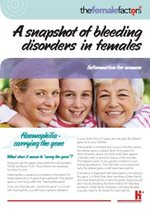

Get your copy of A snapshot of bleeding disorders in females – an information liftout from The Female Factors project
“Until I made contact with HFA I felt as if I was the only person on earth with undiagnosed heavy bleeding problems. It would be nice to help others too so that no one has to suffer in silence.”
What does it mean to live with a bleeding disorder or carry the gene if you are female?
What do you need – or want – to know?
What are the experiences of women and girls affected by bleeding disorders?
How will it help to share these experiences?
The Female Factors is the Haemophilia Foundation Australia (HFA) women and girls project.
The name was chosen by the women and girls participating in the project and shows our commitment to developing information and education resources that acknowledge:
The range of altered factor genes causing bleeding disorders that affect females in our community: factors I, II, V, VII, VIII, IX, X, XI, XIII, and von Willebrand factor
The many factors females need to deal with to manage their bleeding disorder and carrying the gene.
The project is developing specific information and education resources for Australian women and girls affected by bleeding disorders as a priority. These resources include personal stories and tips.
The Female Factors project aims to support Australian women and girls with inherited bleeding disorders by:
HFA is collaborating with a number of expert review groups to develop the information:
HFA’s community consultation has highlighted that information for women and girls with bleeding disorders is a priority area of need.
In a 2002 HFA survey of women with bleeding disorders (1), 51 women responded:
Of these women, 41% were treated by their general practitioner (GP) rather than a haematology specialist. However, the Royal Australian College of General Practitioners acknowledged at the time that due to the rarity of bleeding disorders, no training was provided to GPs on haemophilia or von Willebrand disease (VWD). This was reflected in the women’s comments about their GP’s lack of knowledge about their bleeding disorder. Some thought this had a negative impact on their diagnosis and referral. Many women also spoke about their difficulties in being ‘taken seriously’ by health professionals, as some of their treating doctors held the belief that women cannot have a bleeding disorder.
As a result, many of the women experienced isolation and had fears about and problems with:
This is similar to the experience of women with bleeding disorders in other developed countries such as Canada.(2)
More information was at the top of the Australian women’s priorities for how best to improve this situation.
Our ongoing consultation with women has also pointed to other important topics to cover:
HFA has put together basic information for women and girls:
We have also sourced and published women and girls’ personal stories about living with a bleeding disorder:
The next stage of The Female Factors project is to publish a series of information resources targeted specifically at adult women and another suite for young women and teenage girls.
These resources cover two main areas:
They will answer women and girls’ questions on a range of topics, for example:
The resources will initially be released in topic sections as they are developed. Then when all the topics for each area have been published, they will also be put together into a booklet.
The resources will be high quality evidence-based information, but each topic will be like a magazine lift-out, with coloured blocks of information, tips and personal stories. The resources can be downloaded as PDFs from the HFA website or the Factored In HFA youth website .
How did we come up with this idea? Our thanks go to our dedicated review groups. They have provided:
They also review the resources as they are developed and make sure they are accurate, relevant and speak to the needs of Australian women and girls.
We have been lucky to have Marg Sutherland working with us as a consultant, writing the psychosocial sections of the resources. Marg is an experienced educator and counsellor with an interest in women’s health, well known to some of us for her sensitive work in the bloodborne virus sector and at the Australian Research Centre in Sex, Health and Society, LaTrobe University, Melbourne. She is working closely with the women’s review group, haemophilia health professionals and HFA to make sure the resources reflect the experiences of women and girls in our community and are appropriate to their needs.
Looking for HFA’s most up-to-date information on women and girls with bleeding disorders?
Visit the Women with bleeding disorders section on the HFA websiteVisit the GIRLS sections on the Factored In website
what will you find there?
If you are a woman or girl who carries the gene or has bleeding symptoms – or the parent of one – it’s not too late to be involved.
You can:
And/or
Contact:
Women
Suzanne O'Callaghan
E: socallaghan@haemophilia.org.au
T: 1800 807 173 (Mon-Fri)
Young women and girls
Hannah Opeskin
E: hopeskin@haemophilia.org.au
T: 1800 807 173 (Mon-Wed)
1.Haemophilia Foundation Australia. Women and bleeding disorders project report. Unpublished report, Melbourne, 2002.
Haemophilia Foundation Australia acknowledges the Traditional Owners and Custodians of Country throughout Australia, the land, waters and community where we walk, live, meet and work. We pay our respects to Elders past and present and extend that respect to all Aboriginal and Torres Strait Islander peoples.
Sign up for the latest news, events and our free National Haemophilia magazine